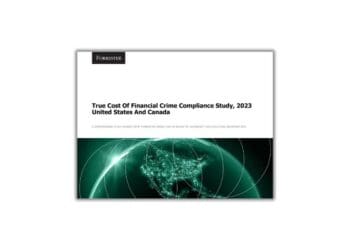With more than $200 billion a year in losses due to transaction fraud, the need for the Financial Technology Protection Act is clear. EverCompliant CEO Ron Teicher discusses the bill’s aims, which have been met thus far with unanimous support from both sides of the aisle.
Republicans and Democrats seem to agree on very little today, but one thing they do agree on is the importance of battling terrorism by focusing on the illicit use of digital currencies.
That is the focus of H.R.56, the Financial Technology Protection Act, which proposes to “establish a Fintech Leadership in Innovation and Financial Intelligence Program to encourage the development of tools and programs to combat terrorist and illicit use of digital currencies, and for other purposes.” The bill, cosponsored by two Republicans and two Democrats, passed the House on January 28th without objections and is now before the Senate, awaiting debate and approval.
Among its other tenets, the bill sets up a committee that will evaluate tech solutions and provide funding to develop promising ones. The bill says, “entities located in the United States, including academic institutions, companies, nonprofit institutions, individuals and any other entities located in the United States that the Secretary determines appropriate,” are eligible for this funding.
The role of digital currency in financing terror and crime is well-known to anyone with an email account. The recent wave of e-mail messages sent out by hackers threatening to expose the recipient as a sexual deviant (they claim to have a split-screen video showing victims “enjoying” porn on their laptops) includes a demand of payment in digital currency to buy their silence. Of course, there are no videos, but the hackers are bold enough to give you their Bitcoin wallet information, where you are instructed to deposit $1,000 worth of Bitcoin. And why not; they know, as well as law enforcement does, that there really is no practical way to track them down, as the accounts are anonymized – sort of like the old numbered Swiss bank account that money launderers and tax cheats used to be able to take advantage of.
If it works for low-level hackers, it will work for international criminals operating on large scales, as well as terrorists. An EU report says that “the public record demonstrates that religiously and politically inspired extremist actors have utilized virtual currencies (VCs) in relatively low-volume and unsystematic fashion and may be seeking to expand their use. The prospect exists for terrorist funding (TF) through VCs to mature and to grow, even if the precise nature, scale and scope of this risk remains difficult to anticipate.”
As mentioned, there are no practical ways to track down digital currency account users, although there are methods that can be used to do so. But that is the point of H.R.56. The bill is a method for the government to reach out to private enterprise to develop systems that will prevent the use of digital currencies, and by extension the banking system, to carry out terror attacks.
In the end, digital currency is really all about the cash, at least for most bad actors, as they have to pay for weapons, personnel, vehicles, materials, living expenses etc. for themselves and their staff. The vendors they do business with, the lower-level people in their employ and the vehicle dealerships they buy from all want real money, at least under the way the economy currently functions. The challenge facing them is hiding the flow of money they collect or launder for these purposes.
Law enforcement and international agencies watch for transactions that involve, for example, the purchase of large amounts of fertilizer to non-farmers, which could be an indication that someone is building a bomb. The trick for terrorists is to hide the transaction while stealthily paying for the products they need to carry out their attack. Digital currencies, which can be transferred to the fertilizer merchant and then cashed out, hidden among their other transactions, is the perfect cover for that transaction.
But there is a point where digital currencies are vulnerable, in that the people using them for illicit purposes can be identified; that is the junction where digital currencies are converted into money. Bad actors who cash out their digital currencies (i.e., sell them to someone else for money) need to deposit that money somewhere, such as in a bank account, debit account, etc. The deposit of cash into an account from any source could be analyzed by a big data system to determine the nature of the transaction between the entity that sent the money and the account that received it.
For example, if the recipient is connected to a suspicious organization (perhaps already listed by law enforcement as someone worth watching) and they get a payment from a consulting firm, that might be enough to trigger an investigation by law enforcement. The analysis to determine that would be done by an automated big data system that would compare specific transactions to a profile of transactions that raise red flags (that profile would be developed by the big data system, which had analyzed billions of transactions) and, equipped with machine learning capabilities, the system would get more accurate and precise with each new search.
That’s just one way technology can be used to track down terrorists, as well as organized crime, international drug dealers and any number of bad actors. Whatever solutions are developed, there is no doubt that big data and machine learning will play a big role. It’s these kinds of solutions H.R.56 is designed to encourage. The passage of this bill is an act of bipartisanship, which – in our current climate of political animosity – underscores the importance of the issue.



 Ron Teicher is the CEO and founder of
Ron Teicher is the CEO and founder of 






